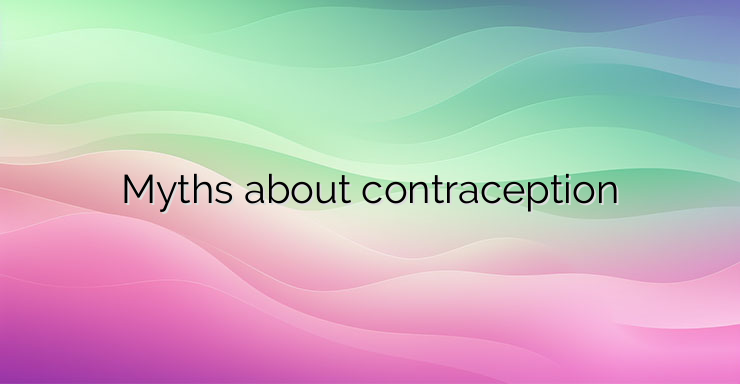There are many myths about contraception. There are a number of birth control methods that are very effective at preventing pregnancy. There is also a lot of misinformation about how birth control is used, and some methods that just don’t work. 1. I breastfeed so I can’t get pregnant Breastfeeding can help prevent pregnancy, until the sixth month after birth, the woman has not had a menstrual cycle and the baby is fed only breast milk. All three criteria must be met for breastfeeding to be a more effective form of contraception. In all other situations, ovulation can occur even when the woman is breastfeeding. A nursing mother should use contraception if she wishes to avoid pregnancy. 2. You can’t get pregnant if a woman doesn’t have an orgasm Pregnancy occurs when a sperm from a man fertilizes an egg from a woman. While a man must ejaculate to release sperm, a woman does not need to have an orgasm to become pregnant. A woman of childbearing age releases an egg each month as part of her regular menstrual cycle. 3. I won’t get pregnant if I shower after sex Douching is not an effective method of contraception. After ejaculation, sperm enter the cervix and are beyond the reach of any flushing solution. Douching is also not recommended as it can disturb the delicate bacterial balance of the vagina, causing irritation or infection. 4. I don’t need contraception because we only have sex during the “safe” time Myths like these most likely arise from a lack of understanding of the menstrual cycle. There are four main hormones (they stimulate or regulate the activity of cells or organs) involved in the menstrual cycle: Follicle-stimulating hormone; Luteinizing hormone; Estrogen; Progesterone. A delicate balance of these hormones regulates the release of an egg (during ovulation) and if the egg is not fertilized, menstruation follows. While a woman’s cycle is more or less regular in most cases, this balance of hormones can be disrupted by a variety of factors, including age, stress and medications. Therefore, timing ovulation and predicting “safe” days can be difficult. 5. I won’t get pregnant if we have sex standing up or if the woman is on top Some people believe that sex in certain positions will cause sperm to leak out of the woman’s vagina. In fact, positions during sex have nothing to do with whether or not fertilization will occur. When a man ejaculates, the sperm are well deposited in the vagina. By nature, sperm will begin to move up through the cervical canal immediately after ejaculation. 6. I won’t get pregnant if my partner doesn’t ejaculate inside me Pulling out before a man ejaculates is not an effective method of contraception. A certain amount of ejaculate (fluid that contains sperm) may be released before the man actually begins to climax.Also, some men may not have the willpower or be able to pull out in time. 7. I won’t get pregnant because I’m having sex for the first time A woman can get pregnant every time she ovulates, even if she’s never had sex before. 8. I won’t get pregnant if I take a shower or bath right after sex, or if I urinate right after sex Washing or urinating after sex will not stop sperm that have already entered the uterus through the cervix. 9. Birth control pills are effective as soon as you start taking them For most women, it takes at least a week for the hormones in oral contraceptives to work with a woman’s natural hormones to prevent ovulation. For the medication to be effective, it must be taken as directed. References: 1. Age and fertility. https://www.reproductivefacts.org/news-and-publications/patient-fact-sheets-and-booklets/documents/fact-sheets-and-info-booklets/age-and-fertility/ 2. Birth control. https://www.llli.org/breastfeeding-info/birth-control/ 3. Birth control. https://www.plannedparenthood.org/learn/birth-control 4. Breastfeeding. https://www.plannedparenthood.org/learn/birth-control/breastfeeding 5. Dreweke, J. (2014). Contraception is not abortion: The strategic campaign of antiabortion groups to persuade the public otherwise. https://www.guttmacher.org/gpr/2014/12/contraception-not-abortion-strategic-campaign-antiabortion-groups-persuade-public 6. Female infertility. (2019)https://www.hhs.gov/opa/reprodctive-health/fact-sheets/female-infertility/index.htmlorg/gpr/2014/12/contraception-not-abortion-strategic-campaign-antiabortion-groups-persuade-public 6. Female infertility. (2019)https://www.hhs.gov/opa/reprodctive-health/fact-sheets/female-infertility/index.htmlorg/gpr/2014/12/contraception-not-abortion-strategic-campaign-antiabortion-groups-persuade-public 6. Female infertility. (2019) https://www.hhs.gov/opa/reprodctive-health/fact-sheets/female-infertility/index.html


Leave a Reply